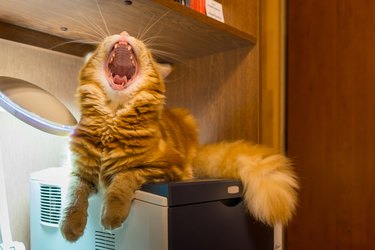If your cat is having trouble swallowing, not eating much food, coughing, or sounding scratchy and quiet when he meows, he may have a sore throat. A cat sore throat can have many causes, from a virus to dehydration or a more serious health issue, like an item lodged in the throat.

Video of the Day
When your cat has a sore throat, work to get more moisture in his diet by providing additional fresh water around your home as well as wet food. Raise the humidity levels in his space to help him feel more comfortable and make his meals more enticing with flavorful food and supplements. If sore throat symptoms continue or are accompanied by other issues, such as lethargy or vomiting, contact your veterinarian to get a proper diagnosis for your pet.
Video of the Day
Signs of a cat sore throat
One of the biggest indicators that your cat has a sore throat is her meow. Like in humans, cats with a throat infection or cat flu often develop laryngitis due to throat and vocal cord inflammation. A feline's muted meow can be presented alongside other symptoms, including difficulty swallowing, dry cough, breath odor, panting, and frequently keeping her mouth open.
Aside from the cat sore throat symptoms, it's always important to watch for other health issues. Loss of fur, matting, diarrhea, constipation, frequent vomiting, lethargy, and hiding are some red flags that something is wrong. Cats with these symptoms should be seen by their veterinarian as soon as possible.
Cat sore throat causes
One of the biggest causes of a cat sore throat is cat flu, or a bacterial or viral upper respiratory infection. Cat flu is often caused by feline herpesvirus or feline calcivirus, contagious illnesses that cats are more likely to catch in shelters or if they spend time in the wild around a large population of their peers.
A sore throat is one of the most common cat flu symptoms in addition to a stuffy nose, mouth ulcer, eye discharge, fever, and lack of energy. You can help lower your cat's risk of catching cat flu again in the future by getting him vaccinated against it.
Pharyngitis, or throat wall inflammation, is often caused by infections, like cat flu, or the issue could be caused by either an abscess, growth, or small item lodged in the throat. A cat who seems to have his typical appetite but struggles to swallow may have pharyngitis. A veterinarian visit as soon as possible is crucial to determine the cause, as an airway blockage can be deadly for cats.
Treating sore throat in cats
Following a veterinarian visit, your pet's doctor may prescribe antibiotics or administer fluids depending on the cause of your cat's sore throat. On the other hand, sometimes, a sore throat is caused by excess fluid, so a vet may prescribe a diuretic to reduce inflammation. Do not attempt to treat your cat's sore throat at home with medication on your own. Follow your vet's advice.
You should, however, help your cat stay comfortable. Encourage her to eat frequently and drink more fluids. When a cat is sick, offer her food often, especially wet food, and monitor how much she is consuming.
You can try feeding your cat by hand or heating up the food to make it more comforting to her. Choose strong-smelling food to make your cat more attracted to it or add a topper for extra flavor and more moisture.
- Apple Valley Animal Hospital: Laryngitis in Cats
- Trudell Animal Health: Feline Upper Respiratory Infection (Cat Flu): What It Is, Signs & Symptoms, And How To Treat It
- Merck Manual Veterinary Manual: Pharyngitis in Cats
- Sharon Lakes Animal Hospital: Cat Laryngitis - What to Do if Your Cat Loses Their Meow
- VCA Hospitals: Caring for Your Sick Cat
- Blue Cross for Pets: Cat Flu
- VCA Hospitals: Recognizing the Signs of Illness in Cats